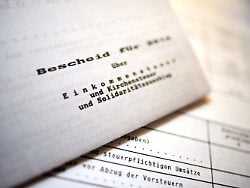Sunday, January 09, 2022
Treasury is becoming more and more fixed
Berlin has the fastest tax offices
Complaints about slow authorities and crippling bureaucracy are popular, but at least something is happening with the tax offices. The processing of tax returns has become significantly faster in recent years. But there are regional differences.
The tax offices in Germany process tax returns in a shorter and shorter time. This was reported by “Welt am Sonntag”, citing an evaluation of more than 300,000 tax returns that were submitted via the online portal lohnsteuer-kompakt.de. Last year, an average of 49 days passed between sending the tax return and receiving the tax assessment. That is four days less than in 2020.
At that time, every taxpayer had to wait an average of 53 days. In 2019 it took 55 days. In a comparison of the federal states, work is currently the fastest in the Berlin tax offices, with an average of 43 days. In Bremen, Thuringia and Brandenburg it takes the longest with an average of 56 days.
In detail, the span between the fastest and the slowest tax office is enormous at 51 days – that’s more than seven weeks. In the fastest tax office in Warburg, North Rhine-Westphalia, the average processing time in the previous year was 32 days. At the bottom of the ranking was the Mannheim-Neckarstadt tax office with an average duration of 83 days.
Automatic processing without tax officials
All tax offices nationwide to which at least 50 declarations were submitted were included in the measurement. That was 502. There are a total of almost 550 tax offices in Germany. The faster processing times are primarily attributed to advances in digitization. Year after year, more tax returns are processed on the computer without a tax officer checking the information again. In 2020, eleven percent of the more than 20 million tax returns were processed automatically.
The German Tax Union sees further potential for improvement, above all in a simplification of tax law. Higher allowances and lump sums would reduce the effort in the tax offices again, said the federal chairman Thomas Eigenhaler of the “Welt am Sonntag”. This could eliminate the need for more individual checks and further reduce processing time.
